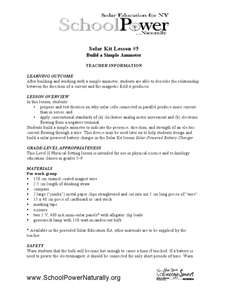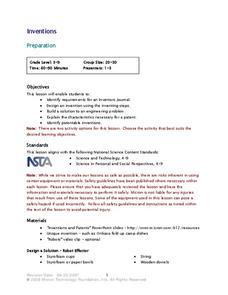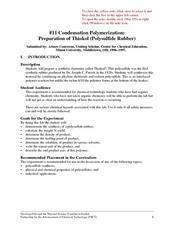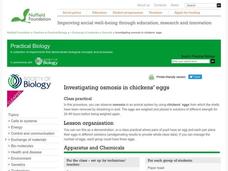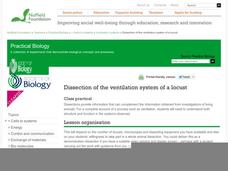Curated OER
Emergency? Ask A Kid!
What is an actual emergency situation and what should you do to prepare for it? Learners will identify a variety of emergency situations and the appropriate way to address first aid concerns to minimize injuries. They will also discover...
Curated OER
Solar Kit Lesson #5 - Build a Simple Ammeter
Emerging electricians build a simple ammeter for making measurements on an electric current. They test the placement of solar cells in both series and parallel circuits and examine the magnetic field produced by the movement of electrons...
Curated OER
States of Matter
Students study the states of matter. In this matter lesson, students use dry ice to study the states of matter. Students observe and answer questions based on the material.
Micron Technology Foundation
States of Matter
Solids, liquids, gasses oh my! Young scientists will be amazed when they try this experiment, which uses dry ice to discover the states of matter through sublimation.
Curated OER
Inventions
Young scholars study invention steps and design their own invention. In this invention lesson, students discuss inventions and the process of inventing. Studnets write in an inventor's journal and study various types of inventions. Young...
Curated OER
Safe Work Habits and First Aid - Level II
Identify and explain the appropriate use and care of basic kitchen equipment. Locate food preparation equipment in the laboratory Identify various types of kitchen equipment Select appropriate equipment for specific product preparation...
Curated OER
States of Matter
Students discuss a given set of questions based on Chemistry and matter and review a glossary of terms. They conduct experiments on each state of matter: "Dry ice and water, Dry ice and soap and Dry ice and Isopropyl Alcohol." and...
Curated OER
Properties of Salt
Students discuss certain properties of salt and how it is used every day as well as harmful uses. They experiment with salt to see it conduct electricity, form crystals and water freezing temperature. They complete a worksheet to record...
Curated OER
AC metrology
In this worksheet, students are asked 11 questions about AC currents and transformers and volt meters. Students can check answers online.
Curated OER
Rate of Solution Lab
In this rate of solution worksheet, students determine how quickly a solute dissolves in a solvent by testing one independent variable such as temperature, particle size or the amount of stirring. Students design their experiments and...
NNF
Floods Happen
Did you know that flooding is the most common natural disaster in the United States? Prepare your learners with the facts about floods and offer them the proper knowledge and tools for dealing with this type of emergency.
Curated OER
Periodic Behavior of Oxides
Students investigate the properties of oxides and observe their periodic trends. For this behavior of oxides lesson plan, students experiment with metallic oxides and non-metallic oxides to determine if they are acid, basic or amphoteric...
Curated OER
Condensation Polymerization: Preparation of Thiokoll® (Polysulfide Rubber)
This lab activity is geared toward experienced chemistry learners, in particular, those who are familiar with organic chemistry. They will create a synthetic elastomer and then make observations and measurements of its different...
Royal Society of Chemistry
Acids and Bases—Microscale Chemistry
Here's proof that small-scale labs lead to big-time learning. Introduce acid-base interactions to middle school scientists through a microscale chemistry lab. Pupils combine a variety of solutions and use indicators to obtain approximate...
Utah Education Network (UEN)
Vocabulary Consumerism
If you receive poor service, should you contact the FDA or the BBB? Discuss important economic terms with a vocabulary practice page. Learners fill in the blanks after each concept and elaborate on its function in the economy.
Science Matters
Earthquake Preparedness
Forty-five states and territories in the USA are at moderate to very high risk of earthquakes. The discussion-based lesson plan covers what to do before, during, and after an earthquake. The 14th lesson plan in the series includes how to...
Curated OER
How Toxic Is It?
Students participate in an activity in which they investigate the scientific method and seed germination as well as practice graphing and metric measuring skills. Students examine toxicity by exposing Wisconsin Fast Plants seeds to toxic...
Cornell University
Constructing and Visualizing Topographic Profiles
Militaries throughout history have used topography information to plan strategies, yet many pupils today don't understand it. Scholars use Legos and a contour gauge to understand how to construct and visualize topographic profiles. This...
Nuffield Foundation
Investigating Enzymes Used in Laundry Detergent
It's a win-win situation: learn about enzymes and get clean clothes, too. Young scientists add enzymes to a dilution of laundry detergent. They apply them to stained fabrics to determine the effectiveness of the enzyme-filled detergents.
Nuffield Foundation
Measuring the Vitamin C Content of Foods and Fruit Juices
Are you getting enough vitamin C? Young scientists determine the amount of vitamin C in fruit juice samples. They accomplish this task by adding DCPIP solution to the samples until the blue color of the DCPIP persists. Once this happens,...
Nuffield Foundation
Investigating Osmosis in Chickens' Eggs
You might not be able to learn through osmosis, but you sure can observe it! Scholars observe and measure osmosis using chicken eggs. They control for multiple variables to determine which variables have an impact and how the impact...
Curated OER
Water Alchemy
After reading "Aquatic Alchemy," an article about recapturing water for reuse when in space, your class will use calcium hydroxide or hydrated lime to purify cloudy water. Geared toward high school chemistry or environmental science...
Nuffield Foundation
Dissection of the Ventilation System of a Locust
Jiminy cricket! If you find yourself plagued by fear of dissection, these locust respiratory system dissection directions will walk you through everything you need to know. Teens inspect a living locust to begin with, then jump over to...
G. Turrell
Science Activity 2: Light & Sound
Little learners experiment with sunlight and map out how light travels. Using a mirror and slotted card, they find out about items that can reflect or absorb the light. They experiment with a variety of materials to find out how light...
Other popular searches
- Electrical Safety Hazards
- Kitchen Safety Hazards
- School Safety Hazards
- Lab Safety Hazards
- Textiles Safety Hazards
- Safety Hazards Images
- Health & Safety Hazards
- Workplace Hazards and Safety
- Health and Safety Hazards



